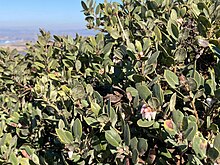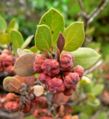Arctostaphylos morroensis
| Arctostaphylos morroensis | |
|---|---|

| |
| Scientific classification | |
| Kingdom: | Plantae |
| Clade: | Tracheophytes |
| Clade: | Angiosperms |
| Clade: | Eudicots |
| Clade: | Asterids |
| Order: | Ericales |
| Family: | Ericaceae |
| Genus: | Arctostaphylos |
| Species: | A. morroensis
|
| Binomial name | |
| Arctostaphylos morroensis | |
Arctostaphylos morroensis is a species of manzanita known by the common name Morro manzanita. This shrub is endemic to San Luis Obispo County, California, where it is known only from the vicinity of Morro Bay.
Distribution
[edit]There are 18 occurrences of the Arctostaphylos morroensis plant, and it is abundant in some local areas.[2] It is largely limited to a specific type of substrate known as "Baywood fine sands", a type of sandy soil which originated in the Pleistocene as windblown sand dunes.[3] The plant is found on less than 900 acres of coastal sage scrub and chaparral habitat, sometimes forming monotypic stands on hillsides.[3]
Two thirds of its habitat is privately owned, some of it is slated for development, and its habitat requirements are narrow; these and other problems led to the plant's being listed as a threatened species in 1994.[3] Some of the plants are protected within Montaña de Oro State Park.[3]

Description
[edit]Arctostaphylos morroensis is a spreading shrub, reaching up to 4 meters in height but generally staying wider than tall. It has shreddy red-gray bark and whiskery bristles on the smaller branches and twigs. The leaves are oval-shaped and slightly convex, dark green on the upper surface and duller gray-green beneath. Plentiful flowers hang in dense clusters on short pedicels during the winter months. They are usually very light pink, urn-shaped, and hairy inside. The fruits are fuzzy red drupes each about a centimeter wide.
Identification
[edit]At the northern extent of its range, this species can overlap with Arctostaphylos osoensis. The two species can be separated by leaf structure: osoensis has heart-shaped leaves which seem to clasp the stem, while morroensis has more typical leaves with a small stem connecting the leaf to the main branch. A. osoensis is also largely restricted to volcanic outcroppings associated with the Nine Sisters, but on occasion morroensis can also occur on this formation, so this alone is not sufficient to distinguish the species.
Cultivation
[edit]The Arctostaphylos morroensis plant is cultivated as a landscaping ornamental plant, for California native plant, drought tolerant, and natural habitat gardens.
-
Bark
-
Leaves and fruit
-
Leaves and fruit
References
[edit]- ^ "NatureServe Explorer 2.0".
- ^ The Nature Conservancy
- ^ a b c d USFWS. Endangered or threatened status for five plants and the Morro Shoulderband Snail from western San Luis Obispo County, California. Federal Register December 15, 1994.
External links
[edit] Media related to Arctostaphylos morroensis at Wikimedia Commons
Media related to Arctostaphylos morroensis at Wikimedia Commons Data related to Arctostaphylos morroensis at Wikispecies
Data related to Arctostaphylos morroensis at Wikispecies- Jepson Manual Treatment — Arctostaphylos morroensis
- USDA Plants Profile for Arctostaphylos morroensis (Morro manzanita)
- Arctostaphylos morroensis — U.C. Photo gallery
- Federal Conservation Status & Recovery Plan




